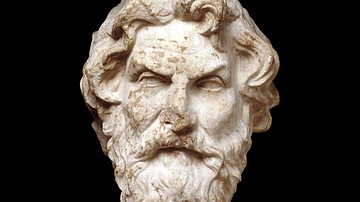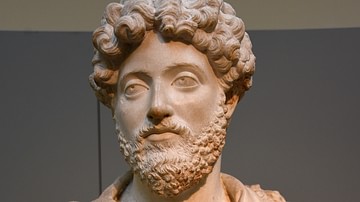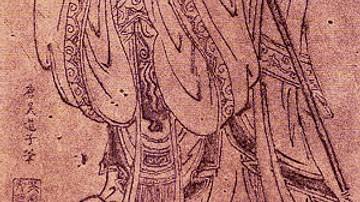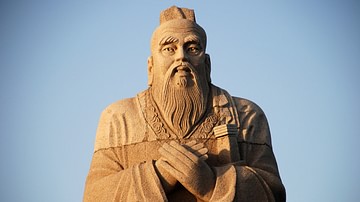
René Descartes (1596-1650) was a French mathematician, natural scientist, and philosopher, best known by the phrase 'Cogito ergo sum' ('I think therefore I am'). He published works on optics, coordinate geometry, physiology, and cosmology, however, he is mostly remembered as the "father of modern philosophy". He lived in a time preceding the Age of Enlightenment that flourished in Europe in the late 17th and throughout the 18th century, a period of revolutionary ideas in government, individual freedom, and religious beliefs. While not a direct participant in the Enlightenment, Descartes' legacy would be his influence on those who contributed to the scientific, political, and social changes throughout this age, an age of reason.
Early Life
René Descartes was born on 31 March 1596 in La Haye, France. His father was a landowner and councilor for the Parliament of Brittany. Beginning at the age of the ten, the young Descartes received his education from the Jesuits at the College de La Flèche in the French province of Anjou - a school founded by Henry IV of France (r. 1589-1610) and considered one of the finest schools in all of Europe. While there, he studied languages, logic, ethics, mathematics, physics, and metaphysics. He would later study at the University of Poitiers where he earned a degree in law, graduating in 1616. Despite what many of his time would consider an excellent education, except in the area of mathematics which he viewed as simple, obvious, and logical, he grew to seriously question the teachings of his teachers. In his work Discourse on the Method, he wrote on his rejection of these early teachings:
I was given to believe that by their [his teachers'] means a clear and certain knowledge could be obtained of all that is useful in life. I had an extreme desire to acquire instruction. But so soon as I had achieved the entire course of study at the close of which one is usually received into the ranks of the learned I had entirely changed my opinion. (quoted in Hutchins, 42)
He was at one of the most renowned schools in Europe but became filled with doubt and with a failed attempt to instruct himself, he soon discovered what he considered to be his own ignorance. Heavily influenced by the ideas of both Galileo (1564-1642) and Copernicus (1473-1543) and their heliocentric view of the universe where the sun, not the earth, was the center of the solar system, Descartes embarked on a long road that would change the very nature of philosophy for generations to come.
Concept of Doubt & Rationalism
During the early 17th century, Europe was undergoing a crucial change in the area of both science and philosophy. Before Descartes' assertion on the concept of doubt and the transition into rationalism, Aristotelean philosophy and scholasticism dominated Western thought, but science initiated a break from this traditional ideology to one based on an individual's own power of reason. In this new way of thinking, initiated by Descartes, the old concept of empiricism where knowledge was acquired by the senses or experience was shown to be unreliable. Science placed a strong emphasis on observation, experimentation, and reason. It was the last of these three that enabled Descartes to question everything that he had been taught to believe and motivate his search for truth. Using only the power of reason, he would try to prove his own existence.
Descartes began this search when he volunteered to serve in both the armies of the Netherlands and Germany and traveled throughout Europe. While stationed in the German province of Bavaria, he had an experience that would completely change his life. On 10 November 1619 to escape from the cold weather, he took shelter in a tiny room, heated only by a ceramic furnace. With little else to occupy his time, he spent his day meditating. One night he had three vivid dreams. Upon awakening, he viewed these dreams as visions, seeing the natural world as a single system with mathematics as its key. He wondered if the certainty of mathematics could be applied to other areas of knowledge. In his Discourses, he wrote of this experience:
…since I found no society to divert me …I remained the whole day shut up alone in a stove-heated room where I had complete leisure to occupy myself with my own thoughts. (44)
After leaving the army and out of fear of persecution by the Catholic Church, he would spend most of the rest of his life in the Netherlands, a country that offered greater freedom of expression than anywhere else in Europe. With the visions he received in Bavaria preoccupying him, he began to search for a new system of thought. Central to this new system of thought was the pursuit of truth. Descartes believed truth could be achieved through the concept of doubt.
Works
From 1629 to 1649 he would produce his greatest works on philosophy, including:
- Le Monde (1633) - a defense of the heliocentric view of the solar system
- Discourse on Method (1637) - the preface to his Optics
- Meditations (1641) - a discussion of his Cartesian theory and God's existence
- Principles of Philosophy (1644) - an examination of the relationship between the body and soul
Although known for his works on philosophy, Descartes wrote extensively on both science and
mathematics. These works included Le Géométrie (Geometry), Les Météores (Meteorology), La Dioptrique (Optics), and Passion of the Soul.
Philosophy
While his Discourse laid the foundations for both his epistemology and metaphysics, his Meditations would revolutionize philosophical thought and introduce a new school of thought: rationalism. In rationalism, knowledge of the world is acquired through the use of reason, not based on the unreliability of the senses.
In his Discourse, he wrote of his own search where he had to “reject as absolutely false everything as to which I could imagine the least ground of doubt” (51). In this search, one must put all of one's beliefs to a rigorous test and reject anything that fails this examination. In his Meditations, Descartes spoke of the need to reject experience and reliance on the senses. To him, true knowledge or truth requires certainty; there can be no room for doubt. An individual must not trust what is seen or experienced, for one's senses can be deceiving. A stick looks bent when half-submerged in water. Reflecting on his past experiences, he wrote:
All that up to the present time I have accepted as most true and certain I have learned from the senses or through the senses; but it is sometimes proved to me that these senses are deceptive, and it is wiser not to trust entirely anything by which we have once been deceived. (75)
In Meditations, Descartes reveals how he eventually arrived at his Cogito – the proof of his own existence. In the beginning, he subjected all of his personal beliefs to the question of doubt by using it as a filter. If an idea failed to pass through this filter, it was discarded. Once an idea had passed or failed to pass, he could rebuild knowledge upon these certainties. Remembering that all complex mathematical proofs are accomplished through a multitude of steps, he developed a series of rules for this search. To begin the process, one must break a question into small portions. Next, build from the easiest and simplest by degrees to the largest and more complex, and, finally, review. One must accept nothing as true which is not presented so clearly there can be no doubt.
Accordingly, if Descartes puts all of his beliefs through this filter, how can he even be certain that he, himself, really exists. Since one's senses can be deceiving, one must not trust anything they tell him. By rejecting any reliance on his own senses, he must find a way to prove his existence. In the end, even reality must be questioned. Can one even prove that one is awake? An individual might be dreaming since some dreams can be vivid; one's entire life might be a dream. Or, a person might be under the influence of an evil demon – a godlike entity manipulating his thoughts. In the end, the only thing one can know for sure is that one exists because one is thinking; therefore, Descartes coined the phrase Cogito ergo sum or “I think therefore I am.”
In his Discourse, he wrote:
…thus, because our senses sometimes deceive us, I wished to suppose that nothing is just as they cause to imagine it to be … I rejected as false all the reasons formerly accepted by as demonstrations. … it was absolutely essential that the “I” who thought this should be somewhat, and remarking that this truth “I think, therefore I am” was so certain and so assured that all the most extravagant suppositions brought forth by the sceptics were incapable of shaking it. (51)
In Meditations I, he recognized that there may be certain things that, at first, cannot be denied. However, he then puts this certainty to the test:
For example, there is the fact I am here, seated by the fire, attired in my dressing gown, having this paper in my hands and other similar matters. And how can I deny that these hands and this body are mine… At the same time I must remember that I am a man, and that consequently I am in the habit of sleeping, and in my dreams represented to myself the same things or sometimes even less probable things, than do those who are insane in their waking moments. (75)
Since it is possible that he is dreaming, he must question the certainty of any sense' perception. But to Descartes, there are certainties: arithmetic, geometry, and the sciences.
For whether I am awake or sleep, two and three together always form five and the square can never have more than four sides, and it does not seen to clear and apparent that truths can be suspected of any falsity (or uncertainty). (76)
Criticism & Atheism
Descartes took the question of doubt to areas later described in his Cartesian dualism as well as ontological proof of the existence of God. It is these areas where he received the majority of his criticism. To Descartes, an individual is a combination of mind and body. Both of these are necessary for perception, memory, imagination, and emotion. However, according to his notion of dualism, the mind and body are separate and distinct; the mind is a thing that thinks and is not physical while the body is physical, a space occupier. The mind could exist without the body; therefore, the mind and body cannot be the same thing. In Meditations VI he wrote: “…there is a great difference between mind and body, inasmuch as body is by nature always divisible, and the mind is entirely indivisible.” (101) Human rationality is based upon this distinction between the mind and body. The mind must contain innate ideas that existed prior to experience, for it is experience that causes the “demon” of doubt.
Some contemporaries criticized this as a slippery slope to a dangerous place: atheism. In 1663, four years after his death, the Holy Office of the Catholic Church condemned four of his books and placed them on the list of banned works. Years later, the Dutch Reform theologian Gisbert Voetuis criticized both his Discourse on Method and his character, calling him vain, vindictive, 'peripatetic', and ambitious.
Although many question the 'how', Descartes believed that God existed and intended to prove it. His ontological proof differs little from those proposed by earlier philosophers such as Anselm. Descartes realized that he was an imperfect being, perishable and finite, but in his mind there existed the concept of an infinite being, eternal, immortal, perfect in every way. This was God. He believed that he could not have invented the concept of God, so, therefore, God exists as a being without fault. In his Meditations III he addressed his beliefs:
Hence there remains only the idea of God, concerning which we must consider whether it is something which cannot have proceeded from me myself. By the name God I understand a substance that is infinite, independent, all-knowing, all-powerful, and for which I myself and everything else, if anything else does exist, have been created. (86)
This God, unlike a godlike demon, would not deceive him, so he cannot be misled by things that he can clearly perceive.
Death & Legacy
In 1649 at the request of Queen Christina of Sweden, Descartes moved to Stockholm to teach her philosophy. Unfortunately, the queen was an early riser which was contrary to Descartes who preferred to sleep late - a practice he had maintained since his days at the College of de Le Flèche. Rising at 5:00 in the morning for the lessons (three times a week) proved fatal, for he caught pneumonia and died on 11 February 1650.
16 years after his death, Descartes' remains, minus his head and one finger, would leave Stockholm and be taken to Paris. In 1667 he is interred at the cemetery of the Church of St. Genevieve du Mont. Years later, he would be moved, still missing his head and finger, and reburied at the Abby of Saint-Germain-du-Pres. While his remains finally found peace - although some continue to argue about the location of his head (it is supposedly in a museum in Paris) - there is no doubt Descartes would be
remembered for his contribution to both science and philosophy.
Part of this legacy was his life-long search for the truth, for knowledge. This new concept of rationalism (although it had roots in the works of Plato) was a search for knowledge or truth using the power of reason and not sensory input. It was an extension of mathematical logic, a rejection of Aristotle's long-accepted belief in empiricism. This innovative notion of an individual's search for truth through one's own ability to reason would remain at the center of philosophy for more than 300 years. In his own time, Descartes influenced other rationalists such as Spinoza and Leibniz. Aside from philosophy, his writings, especially in the area of geometry, would inspire both Newton and Leibniz and their development of calculus. In his book Descartes' Bones, Russell Shorto summarized the effect Descartes had on future generations:
Thus the essence of Cartesianism - its philosophical kernel, which encompassed more than science - not only lived on but expanded into virtually every corner of human life, evolving and adapting and spawning new generations … (79)
While some of Descartes' ideas have been discredited, his influence on both philosophy and science cannot be denied.









